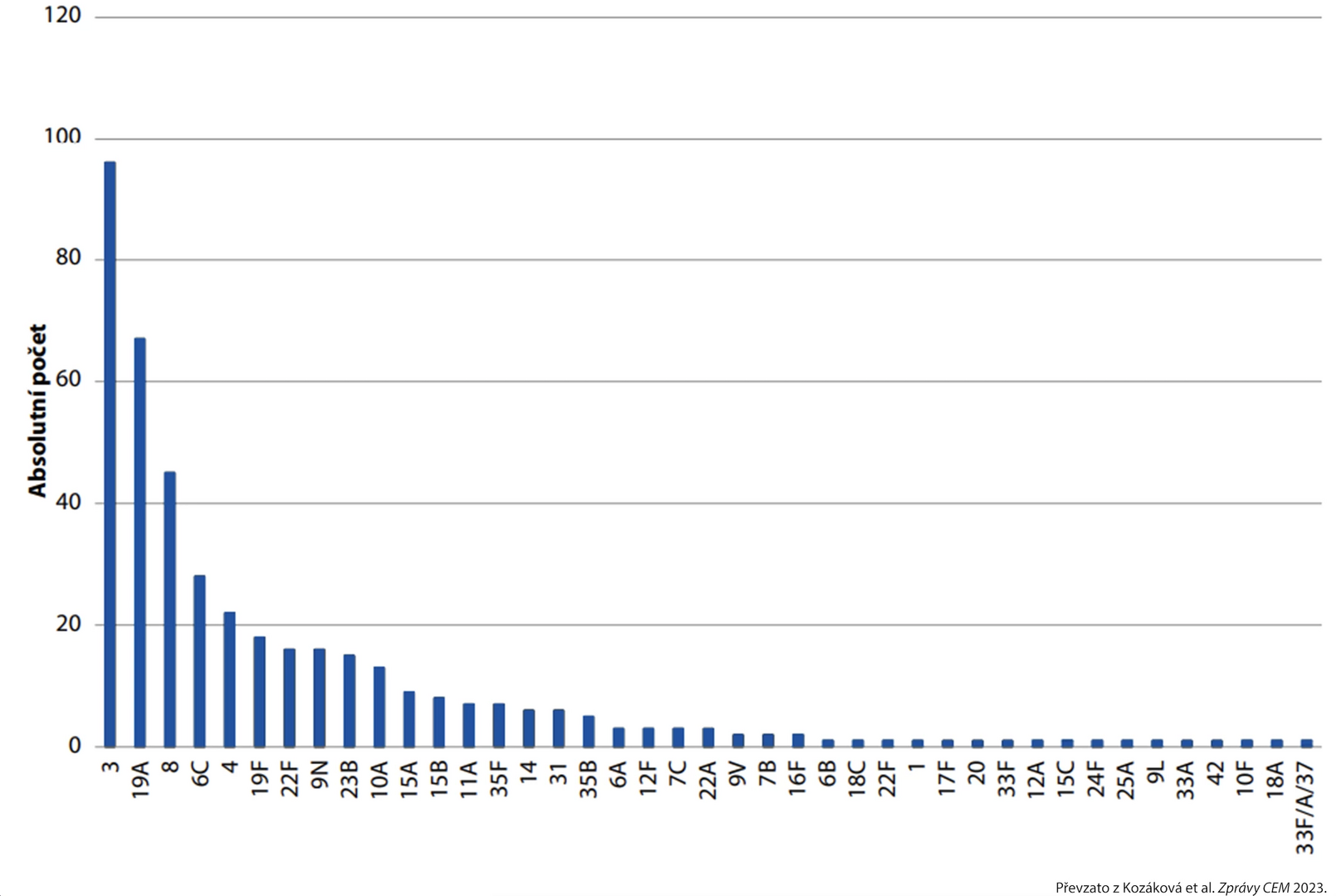-
Medical journals
- Career
Streptococcus pneumoniae Serotype 3 Continues to Be the Most Frequent Cause of Invasive Pneumococcal Diseases in the Czech Republic
26. 10. 2023
After 2 years influenced by the COVID-19 pandemic, the number of cases of invasive pneumococcal diseases (IPD) has returned to pre-2020 levels. Serotype 3 remains the most frequent cause of IPD for the twelfth consecutive year.
IPD in 2022
A total of 472 cases were reported in the IPD surveillance database in the Czech Republic in 2022. For serotype determination, 447 isolates (95%) of Streptococcus pneumoniae were sent to the National Reference Laboratory for Streptococcal Infections (NRL/STR). In 25 cases, the disease was only reported through the Infectious Disease Information System (ISIN) without the isolate being sent to NRL/STR. The laboratory determined the serotype for 432 isolates.
Currently, more than 100 serotypes of S. pneumoniae can be identified based on polysaccharide capsule variations. The currently used methodology in NRL/STR distinguishes 22 serotypes and 20 serogroups (which include 55 serotypes), totaling 77 serotypes.
Examination from non-cultivable (clinical) material assists in the verification of Streptococcus pneumoniae, especially with negative cultures. Additionally, this provides important data regarding the serotype.
Distribution of Serotypes Causing IPD
In 2022, the most common serotypes were 3, 19A, 8, and 6C (see figure). Serotype 3 was responsible for approximately 20% (n = 96) of all IPD cases across age groups. In children under 5 years, this serotype caused approximately 16% (n = 4) of IPD.
The overall mortality related to IPD reached 17.6% (83 IPD), with serotype 3 being confirmed in 20 cases. Serotype 19A was associated with the death of 10 patients, and 8 cases each were caused by serotypes 8 and 6C.
Figure: Distribution of IPD Serotypes by Occurrence in 2022 Across Age Groups in the Czech Republic

Long-Term Trend
The incidence of the most common serotypes causing IPD in the Czech Republic has been relatively stable over the years. Serotype 3 has consistently been the most prevalent, followed by serotype 19A. Over the last 12 years, serotype 8 is the third most frequent, and serotype 22F is fourth. Serotype 3 caused nearly 800 IPD cases from 2011 to 2022, about twice as many as the next most frequent serotype, 19A.
Serotype 3 has many unique biological properties compared to other pathogenic pneumococcal serotypes. It has a thick capsule composed of a "mucous" polysaccharide layer, giving it a characteristic mucous appearance on blood agar plates. It also has high invasive capacity and causes severe infections such as complicated pneumonias and empyemas with high mortality.
Conclusion
Serotype 3 has long been the most frequent serotype causing IPD in the Czech Republic, followed by serotypes 19A and 8. The only effective method of preventing IPD is vaccination.
MUDr. Jana Kozáková
Center for Epidemiology and Microbiology, SZÚ PragueSources:
1. Kozáková J., Žemličková H., Vohrnová S., Křížová P. Invasive Pneumococcal Diseases in the Czech Republic in 2022. Reports from the Center for Epidemiology and Microbiology, SZÚ, Prague, 2023; 32 (6–7).
2. Reports CEM (SZÚ, Prague) 2022; 31 (6): 217–221.
3. Reports CEM (SZÚ, Prague) 2021; 30 (4): 115–120.
4. Reports CEM (SZÚ, Prague) 2020; 29 (6): 246–252.
5. Reports CEM (SZÚ, Prague) 2019; 28 (7): 277–282.
6. Reports CEM (SZÚ, Prague) 2018; 27 (2): 49–55.
7. Reports CEM (SZÚ, Prague) 2017; 26 (1): 21–28.
8. Reports CEM (SZÚ, Prague) 2016; 25 (3): 100–107.
9. Reports CEM (SZÚ, Prague) 2015; 24 (3): 96–101.
10. Reports CEM (SZÚ, Prague) 2014; 23 (3): 89–97.
11. Reports CEM (SZÚ, Prague) 2013; 22 (3): 97–104.
12. Reports CEM (SZÚ, Prague) 2012; 21 (2): 51–58.
13. Lapidot R., Shea K. M., Yildirim I. et al. Characteristics of serotype 3 invasive pneumococcal disease before and after universal childhood immunization with PCV13 in Massachusetts. Pathogens 2020; 9 (5): 396, doi: 10.3390/pathogens9050396.
Did you like this article? Would you like to comment on it? Write to us. We are interested in your opinion. We will not publish it, but we will gladly answer you.
Labels
General practitioner for children and adolescents
Login#ADS_BOTTOM_SCRIPTS#Forgotten passwordEnter the email address that you registered with. We will send you instructions on how to set a new password.
- Career

